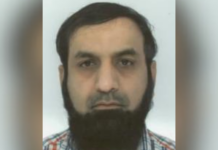Zakir Naik’s Peace TV could face a ban from the UK after the broadcast regulator Ofcom found it in breach of broadcasting rules on hate speech, offence, abusive treatment and incitement to crime.
The rulings related to four separate shows on the channel’s English and Urdu services which dealt with homosexuality, magic, apostasy and marriage.
Ofcom could take the station off air for the breaches but it could also impose a lesser punishment, such as a fine.
In March 2018, Peace TV broadcast a programme called “Strengthening Your Family – The Valley of the Homosexuals.”
This programme was presented by Imam Qasim Khan who made a series of statements about homosexuality, including: “When Adam was created he was given a wife, he was given a woman to help him…and then Allah says in the Qur’an it is he who puts love in the hearts between men and women. That is what Allah says, that is the words of Allah in his perfect book the Qur’an…he says ‘he put love in the hearts between men and women’…There’s nowhere in the Qur’an, there’s nowhere in any of the traditions of Prophet Muhammad (PBUH) where Allah says, or even the Prophet of Islam, Muhammad (PBUH) says, that Allah places love in the hearts between men and men. Or love in the hearts between women and women. That’s a very unnatural type of love that is energised by the influence of Shaitaan…
“Homosexuality throughout the world has gone rampant, but it didn’t just begin. It’s not new, but society made an attempt to soften the blow of homosexuality by giving it softer names, like gay. Gay originally just meant someone who was happy, but they applied gay to homosexuality to soften the blow of the corruption that it represents.”
Ofcom ruled the material broadcast constituted hate speech and was abusive and derogatory towards homosexual people. Ofcome said it discriminated against a group of people on grounds of their sexual orientation.
Subscribe to our newsletter and stay updated on the latest news and updates from around the Muslim world!
Magic
In November 2017, Peace TV Urdu broadcast a programme in which an Islamic scholar, Shaikh Ashfaque Salafi, discussed the Islamic punishment for magicians (and those who practise magic) and appeared to advocate their execution.
Kitaab-ut-Tawheed is a regular weekday programme which features a religious lecture by speaking in Urdu to a group of young men in a studio. The lectures are based on the 19th century religious text Kitaab-ut-Tawheed written by Muhammad ibn Abd al-Wahhab. During the 55-minute programme, the scholar cited chapters and reasoning from the Kitaab- ut-Tawheed to justify the application of the death penalty against those accused of practising magic.
Ofcom ruled that a significant majority of South Asian Muslim people in the UK were likely to have considered these remarks derogatory to their beliefs, custom and practice, “given that many in this community regard the practice of magic such as Ruqya and the use of taweez as harmless and benign practices which form part of their religious faith.”
Apostasy
Also in November 2017, Peace TV broadcast an episode of “Media and Islam, War or Peace?” featuring Dr Zakir Naik.
This programme consisted of Dr Naik answering questions from an Islamic perspective on the interpretation of a variety of Christian and Islamic scriptures in front of an audience of hundreds of Muslim and non-Muslim people in Nigeria.
Approximately 20 minutes into the programme, the moderator read a question written in advance by “a non-Muslim brother or sister”. The question to Dr Naik was about the Islamic punishment for apostasy:

Dr Naik replied: “As far as killing an apostate is concerned, there are differences in opinions. Some scholars say that if a Muslim becomes a Murtad, becomes a non-Muslim, we should put him to death. Some scholars say no, he should only put to death if he propagates his new faith. There’s difference of opinions. As far as the question that there is no compulsion in religion, this verse of the Qur’an is from Surah Al Baqarah Chapter Two, Verse 256, which is La Iqra Fi’deen, there is no compulsion in religion [inaudible], there is no compulsion, no one can force anyone to accept Islam at the point of the sword, but this ruling that is there is like an apostate.
“In any country, a supposed person working in the army, a soldier of an army sells the documents of the country to the enemy, in most of the countries either it is death penalty, or it is a punishment of life imprisonment. Suppose an army general, or a soldier sells the secrets of the country to the enemy, in most of the countries either they will be put to death, or it will be life imprisonment. This is nothing but treason.”
Ofcom ruled that these statements justified hatred based on intolerance towards people who had left the faith of Islam to practice another faith by:
- putting forward the view that the only acceptable Islamic punishment for people leaving Islam for another religion should be death; and
- describing their decision to leave Islam for another religion as an act of “treason” which should be punished by death.
Marriage
Also in November 2017, Peace TV broadcast a 30-minute programme which discussed the Islamic perspective on marriage.
During the episode, ten young women called the programme to ask Dr Naik for his Islamic advice on various issues relating to marriage and relationships.
One caller asked Dr Naik: “We know that according to Islam, when a girl attains the menstruation, when she is mature she should get married. But in India in our own country a proper age of specified for a girl is 18… We see many families get their daughters get married at the age of 15 or 16, so what is [the] proper explanation for this…could you explain?”

Dr Naik replied: “Sister there said that the earliest you can get married is after a person reaches puberty, that doesn’t mean that the moment a girl reaches puberty she should get married. It is not like that, it is as soon as possible means after she reaches puberty, there can be a couple of years that can pass.
“But if someone wants to marry before the age of 18, though the law of the country does not give permission and as long as she does not get into legal implications and she solves the problem and she gets married then there is no problem at all. But in the present scenario that if the girl has to study and if she marries, I mean I feel that the right age in this scenario, average girl or person becomes a graduate at the age of 20,21 so I personally prefer that the age should be 20 to 21, 22, 23. It should not be later than that.”
Ofcom said that “the material was broadcast at 18:30 when families including children were more likely to be viewing. We considered that the audience was unlikely to have expected such views to be broadcast unchallenged, and especially in the early evening. Nor do we consider that the audience was likely to have expected to view content of this type broadcast on a religious channel such as Peace TV, which describes itself as ‘dedicated to teaching Muslims about their religion in a balanced and responsible manner’.”






















